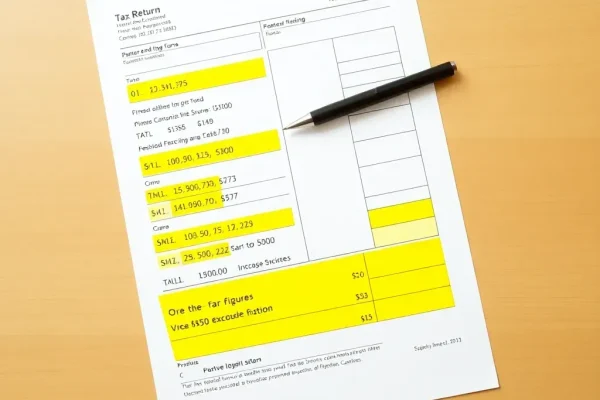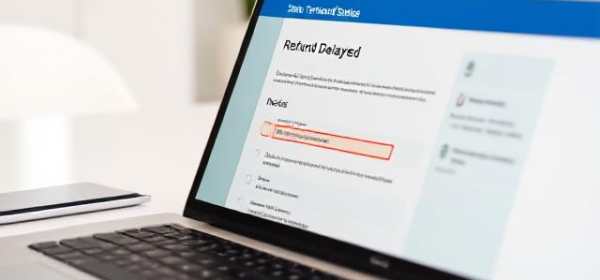It can be frustrating to wait for your state tax refund only to find out it hasn’t arrived. However, there are several reasons why your refund might be delayed or even withheld.
Common causes include processing backlogs, errors on your tax return, or missing documents. In some cases, your refund may have been withheld due to unpaid taxes, child support, or other state or federal debts. Before jumping to conclusions, it’s important to check the status of your refund and determine the exact reason for the delay.
In this guide, we’ll explore the most common reasons for state tax refund delays, how to check your refund status, and what steps you can take to resolve the issue. If you have questions, call (844) 503 – 0401 to speak with our tax professionals.
Common Reasons for a Delayed State Refund
If your state tax refund hasn’t arrived yet, there could be several reasons for the delay. Below are the most common causes of tax refund delays and what you can do about them.
Processing Delays
State tax agencies process thousands of income tax returns during tax season, which can cause delays. If you filed your tax return close to the deadline or opted for a paper return instead of e-filing, expect longer wait times. Some states take several weeks to process income tax refunds, especially during peak filing periods.
Errors on Your Tax Return
Mistakes on your tax return, such as incorrect personal information, typos in your Social Security number, or miscalculations can lead to delays. If your state tax agency detects an error, they may hold your tax refund for further review or request additional documents before releasing your funds.
Missing or Incomplete Information
A missing W-2 form, incorrect banking details, or incomplete income reporting can cause delays in your state tax refund processing. Ensure all required documents are submitted accurately when filing your income return to avoid unnecessary hold-ups.
Fraud Prevention & Identity Verification
State tax agencies have increased security measures to prevent fraudulent tax refunds. If your return is flagged for potential identity theft, you may need to verify your identity before receiving your refund amount. This process can take extra time, especially if you need to submit additional documentation.
Unpaid Taxes or Debts
If you owe back taxes, your state tax refund may be reduced or completely withheld to cover your balance. Other state or federal debts such as unpaid child support, student loans, or court fines can also result in your tax refund being intercepted. If this happens, you should receive a notice explaining the offset.
Bank Account Issues for Direct Deposit
The payment might have been rejected if you opted for direct deposit and your bank details were incorrect. This can cause your tax refund to be delayed while the state tax agency processes a paper check instead. Double-check your banking details before filing to prevent this issue.
Amended Returns or Additional Review Required
If you had to amend your income tax return, expect a longer processing time. Additionally, if your return requires extra scrutiny, such as claiming certain credits or deductions, your state tax refund could take longer to be issued.
Reasons Your State Refund May Be Withheld
If your state tax refund has been delayed or hasn’t arrived, it might not just be a processing issue. Sometimes, state tax agencies withhold tax refunds due to outstanding financial obligations or discrepancies in your tax return. Below are some of the most common reasons your tax refund may have been withheld.
Unpaid State or Federal Taxes
If you owe back taxes, your state tax refund can be used to cover the outstanding balance. Many state tax agencies automatically apply your refund to unpaid state or federal tax debts before issuing any remaining amount. You should receive a notice explaining the offset if your tax refund has been applied to a past-due balance.

Overdue Child Support Payments
State governments can intercept tax refunds to cover unpaid child support. If you are behind on child support payments, your state tax refund may be sent directly to the appropriate agency instead of deposited into your account. You can check with your state’s child support enforcement office to confirm if this is the reason for your withheld refund.
Defaulted Student Loans
If you have defaulted on government-backed student loans, your tax refund may be used to cover some or all of your outstanding balance. Many states participate in the Treasury Offset Program, which allows agencies to seize tax refunds to repay defaulted loans. Contact your loan servicer or the U.S. Department of Education for more details on your repayment status.
Unpaid Court Fines or Government Fees
If you have outstanding court fines, traffic tickets, or other government-imposed fees, your state tax refund may be used to settle those debts. Certain states automatically withhold refunds to satisfy unpaid legal or administrative obligations. If you believe your tax refund was taken for this reason, check with your state’s tax agency or court system.
Unemployment Overpayments
If you previously received unemployment benefits and were later found overpaid, your state may withhold your tax refund to recover the excess funds. This commonly happens if benefits were issued in error or a claimant failed to report additional income while receiving unemployment assistance.
How to Check Your Refund Status?
If your state tax refund hasn’t arrived yet, the first step is to track its status. Below are the best ways to check your state tax refund status and what to do if there’s a problem.

Use Your State’s ‘Where’s My Refund?’ Tool
Most state tax agencies have an online “Where’s My Refund?” tool that allows you to track the status of your refund check. To use it, you’ll typically need:
- Your Social Security number or taxpayer ID
- The exact tax refund amount you were expecting
- Your tax return filing status
Visit your state’s department of revenue or taxation website and look for the “Where’s My Refund?” feature to check your state tax refund status.
Check for Processing Delays on Your Return
If your state refund is still being processed, it could be due to:
- A high volume of tax returns during peak season
- A manual review triggered by an error on your return
- Additional fraud prevention screenings
- Delays related to direct deposit or mailed refund checks
Some states provide estimated processing times, so check your state’s official tax website for details.
Contact Your State Tax Office
Call your state’s tax agency to speak with a representative if you don’t see an update online. Have your tax return details ready, including the date you filed and the expected refund amount. They can provide more insight into why your state tax refund is delayed.
Review Any Notices from the State Tax Agency
If your tax refund is being held due to an issue with your tax return, your state will typically send a notice explaining the problem. Reasons might include:
- Errors or missing information on your tax return
- The need for additional identity verification
- A debt offset, where your state refund check was applied to unpaid taxes, child support, or other obligations
Review any correspondence from your state’s tax department to understand the next steps.
Verify Your Bank or Mailing Information for Your Refund Check
If you requested direct deposit, check that your bank details were entered correctly on your tax return. An incorrect account number can result in your refund check being rejected or misdirected. If you opted for a paper refund check, ensure your mailing address is current.
File a Taxpayer Assistance Request If Needed
If your state tax refund is significantly delayed and you’re unable to get answers, some states offer taxpayer assistance programs. You can request an investigation into your tax refund status if your refund is long overdue.
What to Do If Your Refund is Delayed or Withheld?
- Check Your Refund Status: Visit your state’s refund page and enter your details to track your refund.
- Review State Notices: Look for letters or emails explaining delays or withholdings.
- Contact Your State Tax Office: Call for updates if your refund status is unclear.
- Verify Banking or Mailing Info: Ensure your direct deposit or mailing address is correct.
- Resolve Outstanding Debts: Pay any unpaid taxes, child support, or student loans that may have triggered a refund offset.
- File an Appeal: If your refund was wrongfully withheld, submit a dispute with supporting documents.
- Request Taxpayer Assistance: If delays persist, request a review from your state’s tax agency.
Get Your State Tax Refund Faster with Professional Tax Assistance
If you haven’t received your state tax refund, our tax professionals can help track your refund check, resolve withholding issues, and correct errors that may be causing delays. We provide expert assistance in disputing offsets, verifying information, and ensuring you get your refund as quickly as possible.
Call (844) 503-0401 for personalized tax planning service and take the next step in claiming your refund.

